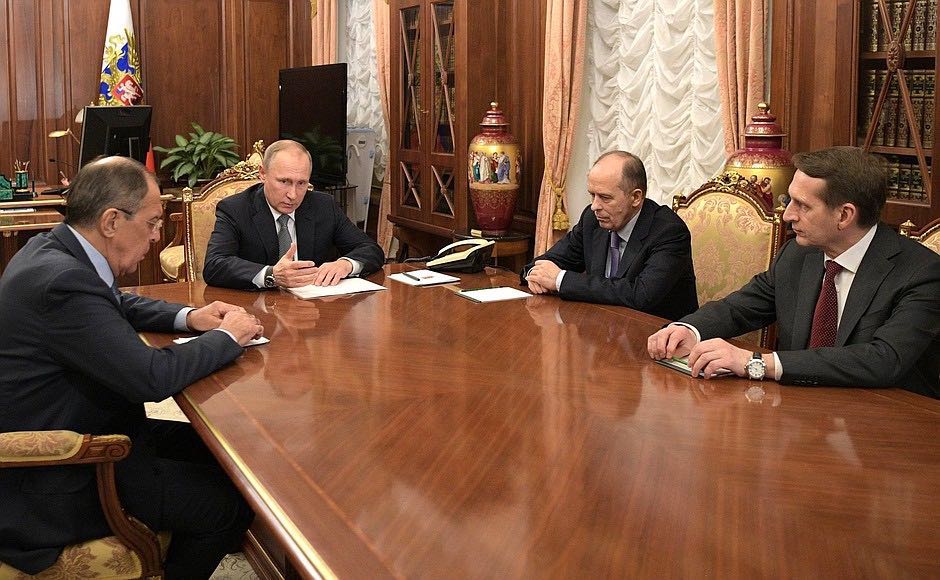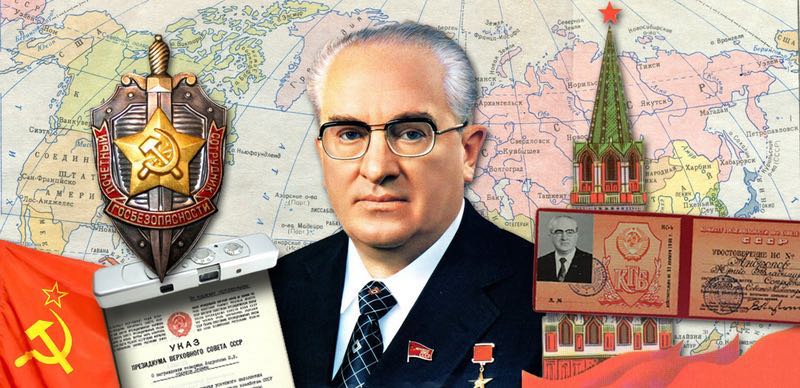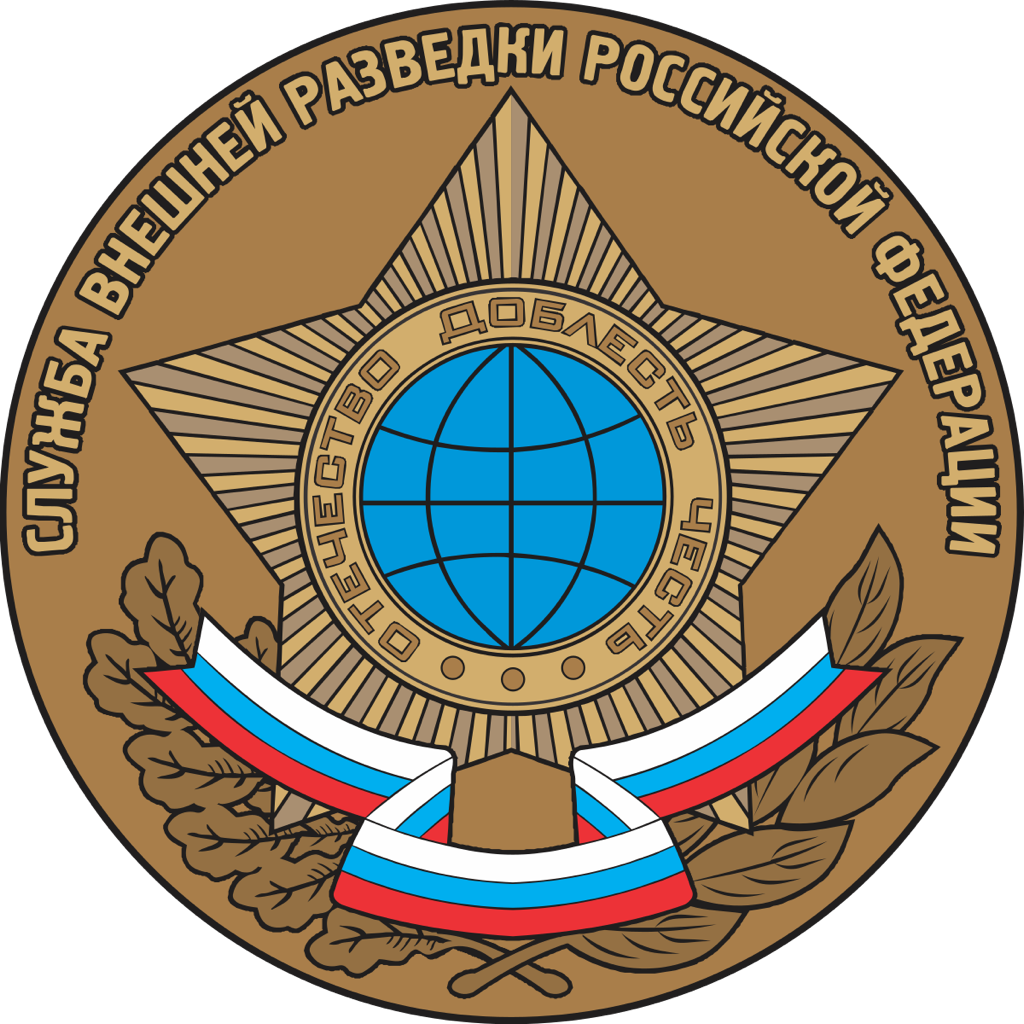There are signs that the political influence of Russia's Foreign Intelligence Service SVR, headed by Sergei Naryshkin, is growing. After Stalin and Andropov Putin is the third Russian leader who politically uses the intelligence services, where he made his career, argues intelligence expert Andrei Soldatov. Since the FSB is compromised by hacking the American elections, and the military intelligence service GRU by the failed assasination attempt on Skripal, the Kremlin now turns to the SVR to keep channels with the West open.
 Putin meets with Foreign Minister Lavrov, FSB-director Bortnikov and SVR-chief Sergei Naryshkin (right). Picture Kremlin.ru
Putin meets with Foreign Minister Lavrov, FSB-director Bortnikov and SVR-chief Sergei Naryshkin (right). Picture Kremlin.ru
It was a busy month for the chief of Russia’s Foreign intelligence agency SVR Sergei Naryshkin.
It started on April 25 in the pompous hotel Ukraine, one of seven famous Stalin’s skyscrapers (now turned into the luxury Radisson Collection hotel), where Naryshkin gave a keynote speech at the VIII Moscow Conference on International Security, attacking NATO and the West.
On May 7th, he was in the museum of the Great Patriotic War on Poklonnaya Hill. As head of the Russian Historical Society, he attacked the West once more by urging to defend the memory of the Russian victory in the Second World War from ‘scoundrels of various kinds’.
A week later, at the House of the Historical Society, he talked about the tourism potential of small Russian towns and at the same time was shown the exposition about the 18th century history of Russian intelligence.
Next day, on May 15th, Naryshkin was in Sochi. In a rather surprising move given his recent anti-Western remarks, he was seen shaking hands with Mike Pompeo, the U.S. State Secretary. He did not eschew the press, but rather presented himself to the presidential pool and told journalists that he thought the restoration of contacts with American intelligence was a good thing and didn’t rule out a possible meeting with the CIA chief.
Naryshkin, in office since October 2016, sounded confident, assured of the reputation of his agency. And why shouldn’t he? He recently got a confirmation of that stature by Putin himself: the Russian president increased from one to five the number of cars with flashing lights for the Foreign Intelligence Service, one of the most visible signs of prestige in Russian bureaucracy. Flashing lights on top of the cars of Putin’s dignitaries show that you better get out of the way as soon as possible, as a very important person is approaching.
Naryshkin’s splash of public activity was quite unorthodox for the director of a spying agency, and even more unusual for Russian intelligence. Naryshkin’s public appearance definitely contrasted with his predecessors’ habits.
Was this a sign of the changing status of the Foreign Intelligence and its chief?
Soviet habits
While the politization of intelligence services has been debated for decades in the West (with the questionable use of intelligence in justifying the invasion of Iraq by the American administration as most obvious example), in the Soviet Union it was never an issue.
From the start of Communist rule, the Soviet secret police was called the Chief Political Directorate, and one of its departments was Foreign Intelligence. During Communism this branch was always politicized. Right until the collapse of the Soviet Union, the Foreign Intelligence branch of the KGB, then known as the First Chief Directorate (Pervoye Glavnoye Upravlenie: PGU), ran joint operations with the infamous Fifth Directorate, targeting Russian émigrés abroad (the Fifth Directorate dealt with dissidents). After all, the KGB was considered the avant-garde troops of the Communist Party, and the Party’s hegemony was enshrined in the Soviet Constitution.
It got even worse when already politicized Foreign Intelligence had to cooperate with a leader of the country who didn’t hesitate to participate personally in intelligence operations.
In the history of the Soviet Union that happened twice.
Josef Stalin loved personally to supervise intelligence operations. This included the killings of political enemies like Trotsky, but it also happened in intelligence collection. In October 1941, when German tanks rolled towards besieged Moscow, in the Kremlin Stalin found precious time to personally instruct the new chief of Soviet intelligence operations in the United States, about to leave for New York.
 Yuri Andropov, head of the KGB, was responsible for the decision to send troops to Afghanistan
Yuri Andropov, head of the KGB, was responsible for the decision to send troops to Afghanistan
The second Soviet leader happy to play spy games was Yuri Andropov, who had run the KGB for 15 years before taking over as head of the Soviet government in 1982, after Leonid Brezhnev’s death.
Both examples show that when the totalitarian country found itself at the mercy of a combination of a spy-savvy leader and a politicized intelligence agency, it always resulted in increased adventurism abroad, ranging from risky and brutal operations up to invasions.
Stalin’s record in this area is well known; Andropov was largely responsible for the decision to send troops to Afghanistan, as he was increasingly in charge of Soviet foreign policy during the last years of the ailing Brezhnev. It was to be expected from a leader who knows all spy tricks, including deceiving and surprising his enemies, allies, and his own population, and relies on the intelligence apparatus with no ethics except loyalty to the political regime.
Changing roles
After the collapse of the Soviet Union, Vladimir Putin became the third national leader happy to join in the spy game. In Yeltsin’s interregnum of 1990s, Russian Foreign Intelligence didn’t abandon its politicized character, but rather used it for self-preservation. Its disinformation units got the assignment to position Foreign Intelligence as the most liberal part of the KGB, proving there was no need to reform it.
With Putin in the Kremlin, this period of entrenchment ended, and the SVR got back in action.

Emblem of the SVR, Sluzhba Vneshney Razvedki, Foreign Intelligence Service of the Russian Federation
In the two decades of his reign Putin intensified the work of his intelligence agencies. Since the beginning of 2000s the presence of Russian intelligence in the West sharply increased, but for many years, the SVR, as most of its Western counterparts do, mostly focused on the traditional areas of gathering intelligence. There were some minor fluctuations, like more emphasis on economic intelligence during the presidency of Medvedev. But when Putin came back to the Kremlin in 2012, new political opportunities opened up to intelligence agencies.
Putin, originally desperate to get recognition in the West, and especially from the United States, after the annexation of Crimea ended up more isolated than any Russian leader since 1980s. Among other things that meant that keeping the usual channels of communication with the Americans open – meaning traditional diplomacy through the Russian Ministry of Foreign Affairs – was becoming less effective.
Therefore Putin turned to his secret services, initially, to his favorite agency FSB, the chief Russian counter terrorism agency. The FSB happily stepped in and engaged its American counterparts over counter terror cooperation, successfully exploiting the Syria issue.
Even after the annexation of Crimea that approach worked pretty well. The chief of the FSB was invited to Washington in 2015, despite the role the Russian security agency had played in Ukraine. The SVR, meanwhile, was working on damage control after the arrest in January 2015 in New York of an SVR officer with no diplomatic cover, Evgeny Buryakov – the spy acted as a New York-based employee of the Russian state-owned Vneshekonombank (Bank of Foreign Economy).
A year later the scandal about Russian meddling in the U.S. presidential election broke. Russian hackers suspected of cooperation with the FSB all over the world were hunted down by the FBI. It was the very first time in history that FSB officers were put on the most wanted list of the FBI.
Revive contacts
So for diplomacy the Kremlin needed another intelligence agency, primarily, to revive the contacts with the Americans. Some groundwork was laid in early 2018 when the heads of all three Russian agencies – FSB, military intelligence GRU and Foreign intelligence SVR – flew to Washington to talk. Notwithstanding the fact that all three are currently under EU and U.S. sanctions (Naryshkin not as chief of Foreign intelligence but as then chairman of the State Duma), they readily got permission to enter the USA.
By that time military intelligence was compromised because of the Skripal poisoning and the aborted spy operation at the offices of the OCPW in the Hague. The FSB after the hacking scandals didn’t look particularly good as well.
That is why on May 15th in Sochi Naryshkin found himself next to Mike Pompeo, the U.S. State Secretary and former CIA chief, Vladimir Putin, his Foreign minister Lavrov, and Putin’s adviser on foreign policy Ushakov.[7] Thus Moscow showed what player to engage with Washington they had in mind.
Are the Americans ready to play along? At first sight there are signs they are. The scandal around Russian interference in the U.S. election started with the exposure of hacking operations carried out by two groups – Fancy Bear and Cozy Bear. While Fancy Bear was identified as a front organization of the Russian military intelligence GRU, with Cozy Bear the attribution was a bit more complicated. First, the investigators hinted it was the FSB, but then changed to the SVR.
But in the Mueller report, published in April and intended to be the exhaustive account of what had happened in 2015-2016, several sections were devoted to the cyber activities of the GRU, whereas the SVR is not mentioned at all. It looks like the door is open.
Naryshkin will be happy to have his agency play a more active role in Kremlin’s foreign policy.
The question is, will his political moves be always beyond Russia’s borders. Unlike his predecessors in the SVR, Naryshkin is not only a seasoned spy, under Putin he had a long and successful career in domestic politics - as chief of the Presidential Administration and speaker of the State Duma. A politicized intelligence agency in itself is a challenge. The challenge posed by politicized high-ranking intelligence officers is a completely different thing.
The stakes are getting higher every day as Putin is locked in desperate search of a solution of the succession problem of 2024, when his last presidential term ends. How is he to stay in power and who are the people who might secure his standing and his legacy either as his successor or coconspirator in his schemes?
